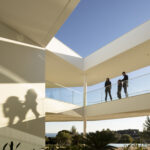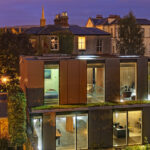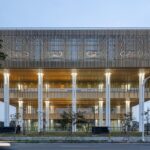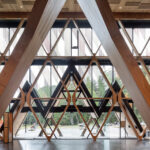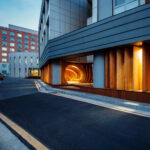The value of public open space versus that of cultural institutions was thrust into the spotlight in the Windy City last week when the Chicago Park District board voted to transfer some 20 acres of parkland to the city if the University of Chicago is successful in its bid to host Barack Obama’s Presidential Library.
The vote comes as a severe blow to local preservationists, who believe that the social and environmental value of Washington and Jackson parks — the public spaces set to be affected by the proposals — means they should be protected at all costs.

The proposed sites marked in teal (Washington Park) and red (Jackson Park)
They also question the University’s priorities, arguing that other facilities should come ahead of any aspirations to host Obama’s archival institution; in January, protestors went as far as staging a ‘die-in’ at Hyde Park Academy High School, calling for a much-needed trauma center unit that could be facilitated by the University.
Green space within large American cities has long been considered sacrosanct, with the law of eminent domain being used by councils to purchase private land and convert it to parkland, which offers both for its quantifiable and intangible health benefits as places where people can escape from their frenetic working lives, relax and exercise, and breath clean air.

© Michael J. Kardas
Overview of Washington Park. Via YoChicago
Parks of outstanding size and historic prominence are celebrated as great urban success stories by many locals, who are fiercely protective over them. In an attempt to engender empathy from New Yorkers over Chicago’s plight, the Economist asked a provocative — albeit largely rhetorical — question:
“Can you imagine plonking the Obama library into the middle of Central Park?”
Of course, we shouldn’t forget that the Metropolitan Museum of Art was ‘plonked’ on the eastern edge back in 1870, so perhaps it isn’t as inconceivable as one might think.
On the flip side, the Library has support from some quarters in authority and from certain residents, who tout the proposed building’s positive impact on the local economy. Renderings released by City Hall recently also hinted at public realm improvements on Garfield Boulevard and Stony Island Avenue, should the bid be successful. Bernita Johnson-Gabriel, Executive Director of Quad Communities Development Corporation, argued that the advantages far outweigh the sacrifice of the 20 acres: “Giving up a few trees versus new businesses, jobs, and empowering our youth, you can’t beat that.”

Proposed improvements to Garfield Boulevard. Via Curbed
Of course, any proclamation that begins with “giving up a few trees” is likely to spark infuriation from those who hold parks up as the civic lifeblood of our cities. Chicago officials, for their part, have also defended the prospect, stating that their approach is ‘park positive’: any green space lost in Washington or Jackson Parks will be made up in other regions of the city, so there will be no net loss of public green space.
However, not everyone buys this argument: Charles Birnbaum, CEO of The Cultural Landscape Foundation, wrote an open letter to Barack Obama himself, notifying the President that “selective amputation cannot be remedied with an acre-for-acre swap,” and that the proposal would result in a “permanent disfigurement” of the park.

The Japanese Garden, Jackson Park. Via Wikipedia
Perhaps the most persuasive protestation of all, though, is that of Mary Pattillo, a Professor at Northwestern University who is more familiar than most with the site in contention: she runs in Washington Park every day. Pattillo points out that while she believes the Library would be a welcome cultural addition to the city, there is in fact no need for it to be brought in at the expense precious parkland. According to council records, there is over 142 acres of city-owned vacant land in the vicinity of Washington and Jackson parks, in which Pattillo is adamant that there is “adequate space to build a library, and then some.”
It seems peculiar, then, that the University of Chicago is electing to charge forwards with their proposal to consume a chunk of these prized green spaces. Most would agree that the Presidential libraries are important cultural institutions that run valuable educational activities, and have also stood as a symbol of transparency and democracy since the first was established for Franklin Roosevelt’s records in 1939. However, surely Obama would prefer his to be built on an unused plot rather than on the fields of Washington park?
We await the President’s response to Charles Birnbaum’s open letter with interest. Parks have never been so political…
Yours civically,
The Angry Architect

